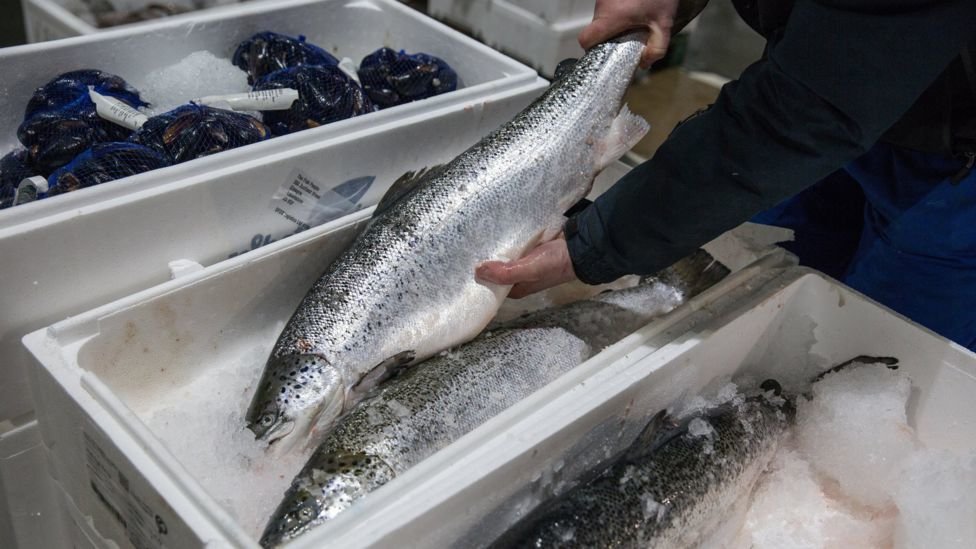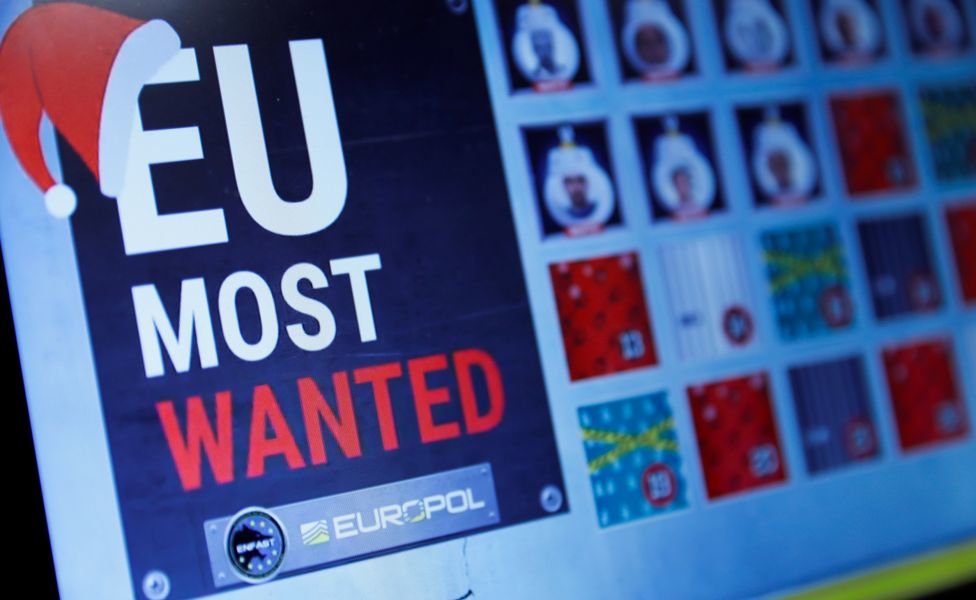
Brexit deal: What is in it?
It avoids the disruption of a no-deal Brexit in the middle of the Covid pandemic, and marks a new era after more than 40 years of UK membership of the European Union.
We've now seen a copy of the text - more than a thousand pages of dense legal text which outline how the relationship will operate in the future. Here are 10 initial questions and answers:
1. Fishing
One of the most difficult issues in the negotiations: How many fish will EU boats be able to catch in UK waters in future, and how long will any transition period last before new measures come into full force? Officials involved in the negotiations say the UK initially wanted an 80% cut in the value of the fish caught by EU boats in UK waters, while the EU initially proposed an 18% cut. Who has given more ground?
Answer: The value of the fish caught by the EU in UK waters will be cut by 25% - which is a lot less than the UK initially asked for. The cut will be phased in over a transition period lasting five and a half years - which is a lot shorter than the EU initially asked for. Once the transition period is over, the UK will fully control access to its waters, and could make much deeper cuts If it decides to exclude EU fishing boats they can be compensated for their losses, either through tariffs on UK fishing products or by preventing UK boats from fishing in EU waters.

2. The "level playing field"
What will the rules on fair competition look like, to ensure that businesses on one side don't gain an unfair advantage over their competitors on the other? The definition of what constitutes reasonable levels of state aid, or government subsidies for business, will be important.
Answer: There are level playing field measures which commit both the UK and the EU to maintain common standards on workers rights, as well as many social and environmental regulations. This was a key EU demand. They don't have to be identical in the future, so the UK does not have to follow EU law, but they do have to be seen to protect fair competition.
The UK has also agreed to stick to common principles on how state aid regimes work, and to an independent competition agency which will assess them. But it can choose to develop a system which only makes decisions once evidence of unfair competition is presented. That is different from the EU system which assesses the likely impact of subsidies before they are handed out.
3. Dispute resolution
This will be the subject of years of negotiations to come. How will the deal actually be enforced if either side breaks any of the terms and conditions? If the UK chooses to move away more radically from EU rules in the future, how quickly can the EU respond? Will it have the ability to impose tariffs (or taxes on UK exports) in one area (for example on cars) in response to a breach of the agreement in another (fish, for example)?
Answer: If either side moves away from common standards that exist on 31 December 2020, and if that has a negative impact on the other side, a dispute mechanism can be triggered which could mean tariffs (taxes on goods) being imposed. It is based around a "rebalancing" clause which gives both the EU and the UK the right to take steps if there are significant divergences. This clause is much stricter than measures found in other recent EU trade deals, and was a key demand on the European side. It is a mechanism we may hear a lot more about in the coming years.
The overall policing of the trade agreement also means that tariffs can be targeted at a specific sector as a result of a dispute in another. There will be a binding arbitration system involving officials from both sides. It means that even though this is a tariff-free agreement, the threat that tariffs can be introduced as a result of future disputes will be a constant factor in UK-EU relations.
4. European Court of Justice (ECJ)
The EU's highest court will remain the ultimate arbiter of European law. But the UK government has said the direct jurisdiction of the ECJ in Britain will come to an end. So, will the European court play any role in overseeing the future relationship agreement?
Answer: The EU has dropped its demand that the ECJ should play a direct role in policing the governance of the agreement in future. That was a clear British red line. One place where the ECJ will still play a role is Northern Ireland, which has a special status under the terms of the Brexit withdrawal agreement. It will remain subject to EU single market and customs union rules, which means the European Court will remain the highest legal authority for some disputes in one part of the UK.
5. Travel

What will the rules be for British people who want to travel to the EU from 1 January 2021? We already know some of the details but will there be any additional agreements on things like social security or vehicle insurance? And will there be any detail on any arrangement to replace the European Health Insurance Card (EHIC)?
Answer: UK nationals will need a visa if they want to stay in the EU more than 90 days in a 180-day period. They will still be able to use their EHICs which will remain valid until they expire. The UK government says they will be replaced by a new UK Global Health Insurance Card (GHIC), but there are no further details yet on how to obtain it.
EU pet passports will no longer be valid, but people will still be able to travel with pets, following a different and a more complicated process.
The two sides agreed to co-operate on international mobile roaming, but there is nothing in the agreement that would stop UK travellers being charged for using their phone in the EU and vice versa. UK citizens will not need an International Driver's Permit to drive in the EU.
6. Financial services
The trade agreement is primarily about the rules for goods crossing borders. It will say far less about the trade in services. Is there going to be a separate statement from the EU which will recognise UK rules governing financial services as roughly "equivalent" to EU rules? That would make it much easier for UK firms which export services to continue doing business in the EU market.
Answer: There is, as expected, not a lot in this agreement for service companies to cheer about. The UK will still be hoping that the EU issues an "equivalence" decision on financial services in the near future, but service companies in general have not got as much help in this deal as the British government had been pushing for. The guaranteed access that UK companies had to the EU single market is over.
7. Data
This is a really important issue. What will the data protection rules be for UK companies that deal with data from the EU? Again, the UK is hoping the EU will issue a separate decision recognising UK rules as "equivalent" to its own, but the detail will need to be scrutinised carefully.
Answer: Both sides say they want data to flow across borders as smoothly as possible, but the agreement also stresses that individuals have a right to the protection of personal data and privacy and that "high standards in this regard contribute to trust in the digital economy and to the development of trade." That's why an EU decision to recognise formally that UK data rules are roughly the same as its own is so important - and we're still waiting for that.
8. Product standards
We know there will be more bureaucracy and delays at borders in the future, for companies trading between the UK and the EU. But will the two sides agree any measures to make things a little easier? There's something called "mutual recognition of conformity assessment" which would mean checks on products standards would not need to be nearly as intrusive as they otherwise might be.
Answer: There's no agreement on conformity assessment even though the UK government had hoped there would be. It's just one reminder of how many new barriers to trade there are going to be. In future, if you want to sell your product in both the UK and the EU, you may have to get it checked twice to get it certified.
On other border issues, there is also no agreement on recognising each other's sanitary and safety standards for exporting food of animal origin, which mean there will have to be pretty intrusive and costly checks for products going into the EU single market.
There will however be some measures which cut technical barriers to trade, and the mutual recognition of trusted trader schemes which will make it easier for large companies to operate across borders.
9. Professional qualifications
A lot of people, from accountants to chefs, work in different EU countries and didn't have to worry about crossing borders multiple times while the UK was part of the EU. But will UK professional qualifications be recognised across the EU in the future, and what restrictions will there be?
Answer: The short answer is no - they won't be recognised automatically. That will make it harder for UK citizens supplying any kind of service to work in the EU. They will often have to apply to individual countries to try to get their qualifications accepted, with no guarantee of success. There is a framework in the deal for the UK and EU to agree on mutually recognising individual qualifications but that's weaker than what professionals have now.
10. Security
It's not just about trade. The UK will lose automatic and immediate access to a variety of EU databases which the police use every day - covering things such as criminal records, fingerprints and wanted persons. So what kind of access will they have, and how will security co-operation work in the future?

Answer: The UK loses access to some very key databases but will have continued access to others, including the system which cross-checks fingerprints across the continent. But overall, security cooperation will no longer be based on "real time" access. And in some cases, such as access to data on which flights people take, that data will only be made available under much stricter conditions.
An agreement has been reached on extradition, and the UK's role in Europol, the cross-border security agency, allows it to sit in on meetings but not have a direct say in decisions. Both of these are positive, and on a par with the best other countries have achieved.
Disagreements over data will be dealt with by a new committee, not by the European Court of Justice - again, a red line for the UK. But taken together, the speed with which the UK gets important data, and the influence it has on decisions, has been reduced.










